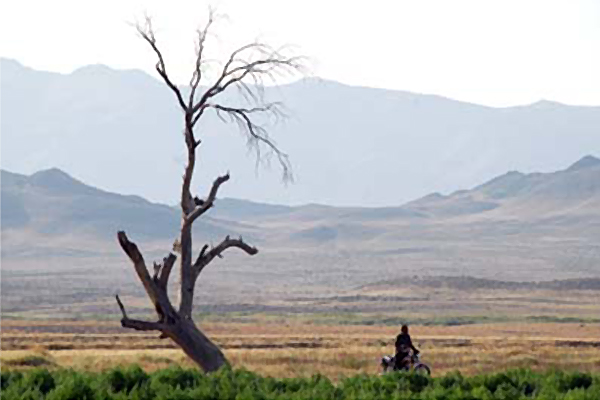|
Reviews of Recent Independent, Foreign, & Documentary Films in Theaters and DVD/Home Video

THE SONG OF SPARROWS When Karim (Reza Naji) turns his back, a runaway ostrich sprints from its pin. With the farmhand in hot pursuit, it gracefully glides up a mountainside—an amusing visual sight but one that has huge consequences, like many of this absorbing film’s slice-of-life incidents. (The cost to Karim’s employer: $2,000.) The next morning, Karim roams the mountainside looking for the giant bird, finding two feathers and a broken egg, but no sign of the elusive animal. In a following shot, what at first glance looks like a mirage turns out to be Karim, camouflaged as an ostrich, adopting its angular gait, ostensibly like in a mating ritual. The scene would be purely comedic if Karim’s movements were exaggerated, but they’re too precise, too well observed. His plan looks ingenious. After being fired from the farm, Karim moves forward and takes advantage of unexpected opportunities. Constantly on the move, he drives his ancient motorbike into smog-shrouded, bustling Teheran, where he’s bombarded by nouveau riche material wealth, and picks up extra money not only for the bare necessities but also to repair his eldest daughter’s damaged hearing aid. At first, he picks up discarded trash to take back to his family, who live in a small, one-room home in the rural outskirts of the city. We’re not talking luxury goods here, but a TV antennae simply for reception. But he doesn’t know when to quit, accumulating more odds and ends until his front yard resembles an urban junk heap. Deadpan comedy resurfaces in the pathos, and vice versa. From one connected episode to the next, director Majid Majidi increases the urgency for Karim, whether it is in his search for the ostrich or during his travails in the fast-paced, anything-goes big city. Karim’s leathery face makes it difficult to determine his exact age. He could be anywhere from 35 to 55. And it’s highly likely that he’s barely educated, since he’s not so good at making change. Majidi definitely hasn’t created a saint. With bloated pride, Karim doesn’t always do right by his family, violently lashing out when his children infringe on his role as bread winner. (A close-up of his only son looking out of a tin drum with large, teary brown eyes momentarily threatens to completely sentimentalize the film's starkness.) However, while Karim’s decency is tested, he has neither anger nor resentment toward his lot (his children, yes). For those looking for more of a critical look at Iran, there’s always Jafar Panahi’s scathing Crimson Gold. The film
abounds in metaphors. Even the son dreams of striking it rich through
selling gold—gold fish, that is, and not coincidentally a symbol for prosperity in Iran and elsewhere. But the story is so
well told that the symbolism supports rather than sustains the plot.
What better metaphor for tenacity than an ornery, ungainly but oddly
beautiful ostrich. Kent Turner
|

